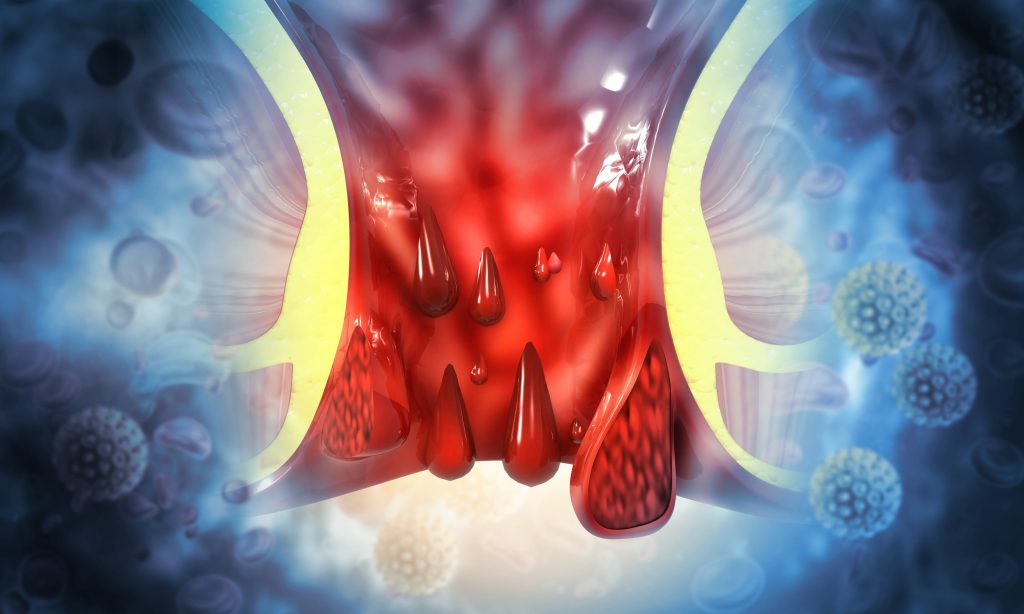
Did you know that piles, also known as haemorrhoids, are very common? Studies have shown that about 50% of people experience piles by age 50. These are swollen veins in the anus, often associated with advancing age, diarrhoea, constipation, prolonged sitting and straining.
What are Piles/Haemorrhoids?
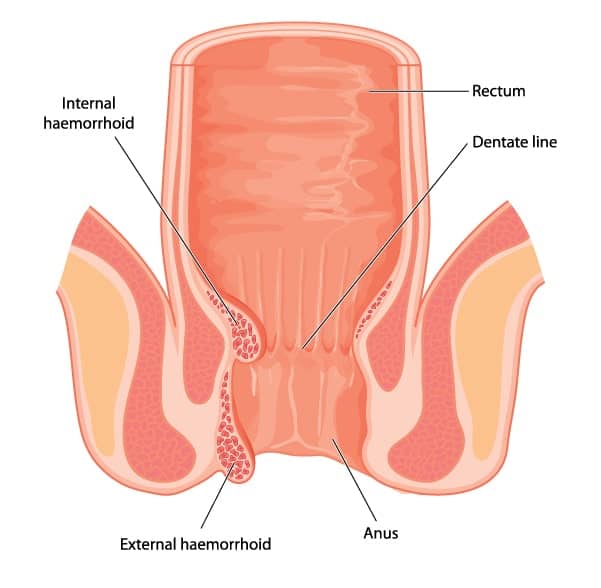
Piles, also known as haemorrhoids, are lumps that are found inside and around your anus (external haemorrhoids) and lower rectum (internal haemorrhoids). that are a result of swollen veins. Piles can cause pain, discomfort and even bleeding in some cases.
There are two types of haemorrhoids which differ from each other depending on where they occur:
Internal haemorrhoids — occur inside the anal canal and are usually painless but tend to bleed.
External haemorrhoids — occur outside the anal canal and may cause pain. These are also more obvious as they present as hard and itchy lumps.
Another difference between the two types is that internal haemorrhoids treatment will differ from how external haemorrhoids are treated.
Are Piles/Haemorrhoids a serious condition?
Piles / Haemorrhoids are not a serious problem and generally go away on their own. However, they may lead to more serious conditions or cause great discomfort to the patient.
What are the common symptoms of Piles / Haemorrhoids
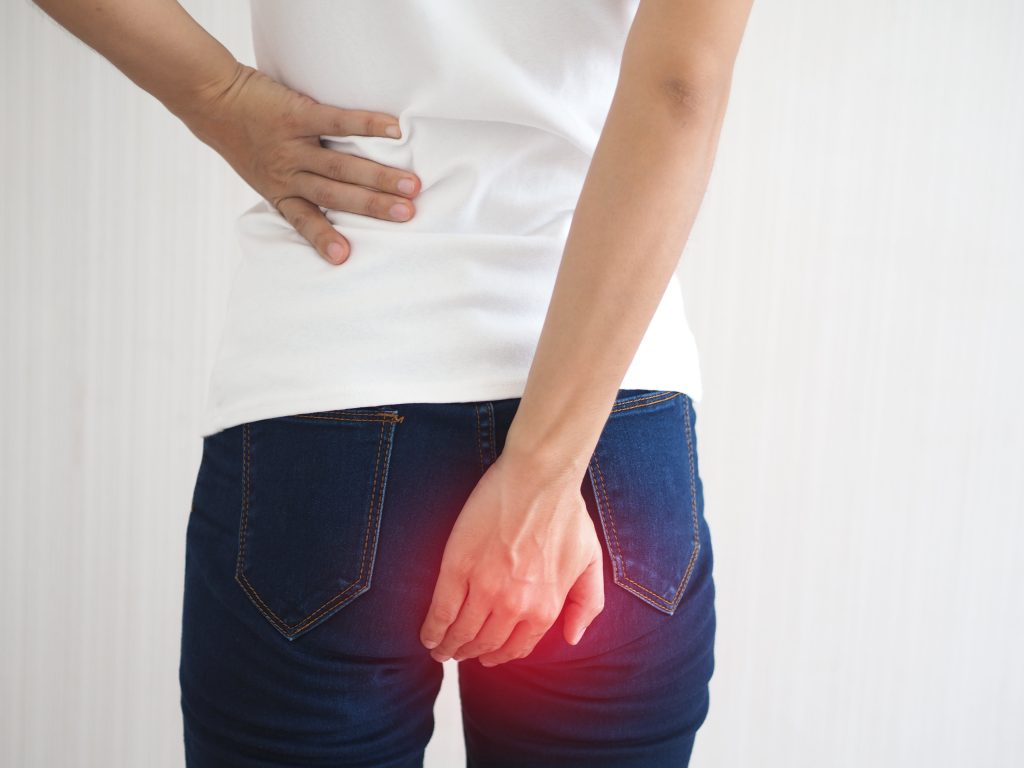
It is important to recognise symptoms of piles so you can seek treatment as soon as possible. Some symptoms of piles to look out for are:
- Bloody stools
- Itchy anus
- Lumps around anus
- Pain around anus
- Swelling around anus
If the symptoms of the condition persist or if new symptoms emerge, contact us at Alpha Digestive and Liver Centre for a proper diagnosis and effective haemorrhoids treatment in Singapore.
What Causes Piles / Haemorrhoids?
Piles / Haemorrhoids are commonly caused by extra pressure exerted on the veins in your anus and lower rectum, causing inflammation and swelling. The most common cause of piles is over-straining during bowel movements due to chronic diarrhoea or constipation. Other causes include:
- Pregnancy: Due to extra weight of the fetus on the pelvic area
- Age: About 50% of people aged 50 years old and above develop piles
- Weight: People who are overweight tend to develop piles
- Low fibre diets
Can Stress Give Me Piles?
Indirectly, yes. Stress could lead to digestive problems, which, in turn, lead to constipation and diarrhoea. These chronic conditions can cause haemorrhoid flare-ups.
What foods trigger piles?
Foods with less fibre content, such as processed foods and dairy products, could cause you to have chronic constipation, which may result in triggering piles.
How Are Piles Diagnosed?
Piles are diagnosed by performing several tests, such as:
Physical examinations
The doctor checks your anus and lower rectum for swollen blood vessels, which are a sign of piles.
Digital rectal examination
The doctor will insert a gloved, lubricated finger into the anus to check for any abnormalities.
Proctoscopy and anoscopy
A hollow, lighted tube is inserted into the anus to check for any haemorrhoids.
Colonoscopy
A lighted tube is inserted through the full length of your large intestines to check for abnormal growths or bleeding.
Some of these tests are also run to rule out other diseases that have similar symptoms to piles.
Treatments for Piles / Haemorrhoids
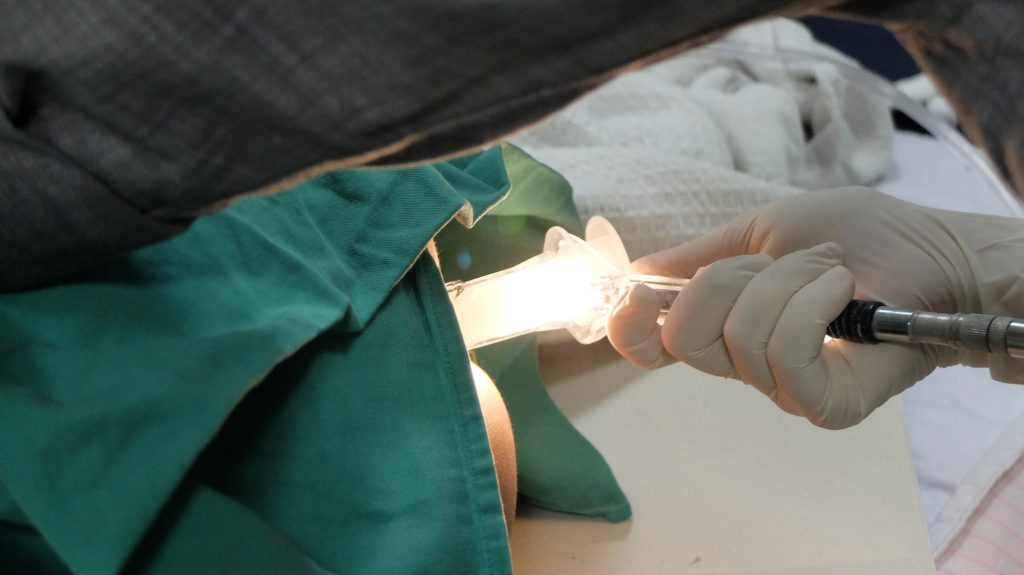
As mentioned earlier, internal haemorrhoids treatment differs from how external haemorrhoids are treated. While external haemorrhoids do not require treatment unless they become acutely thrombosed or cause pain, internal haemorrhoids can be treated with medication or other non-surgical procedures. Surgery is usually prescribed for high-grade internal haemorrhoids or if the non-surgical approaches have failed.
Home treatment for piles includes:
Pain relievers
Consumption of painkillers such as aspirin and ibuprofen can help relieve the pain and reduce discomfort.
Stool softeners
Consumption of laxatives and stool softeners can help make pooping easier, reducing pain.
Topical creams
Topical creams containing corticosteroids can reduce inflammation, swelling and pain.
Maintaining a high fibre diet
Apart from home treatments, there are also medical treatments available. Minimally-invasive medical treatments for haemorrhoids are usually done outpatient and without anaesthesia. These minimally-invasive medical treatments for haemorrhoids include:
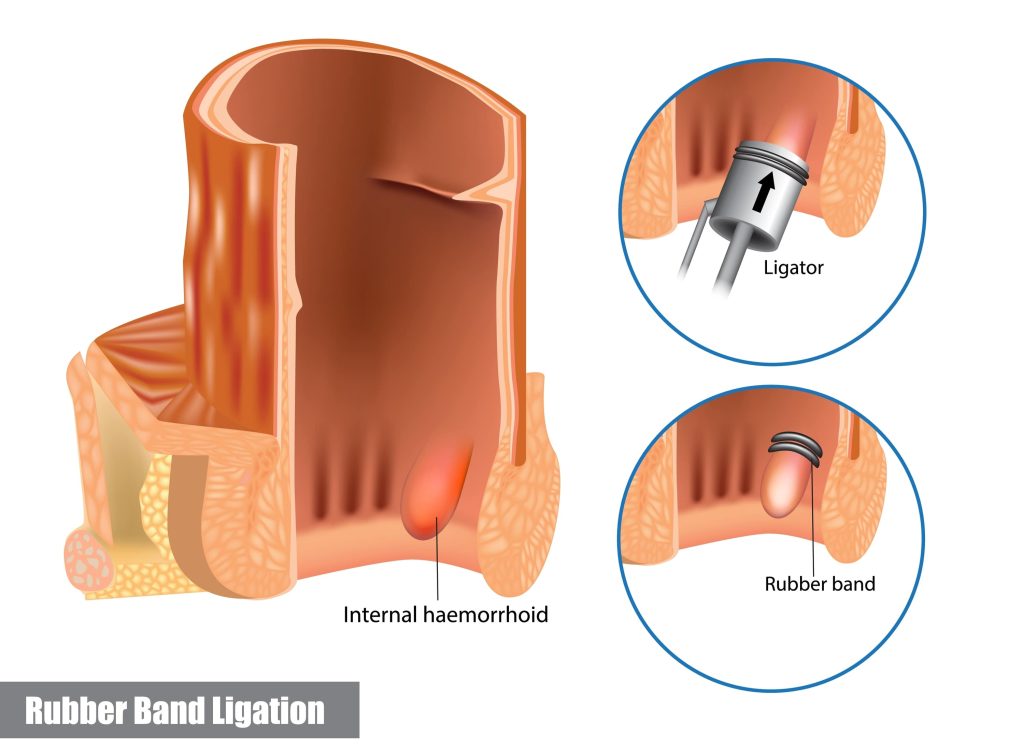
Rubber band ligation
Your doctor will place two rubber bands around the base of the internal haemorrhoids to cut off its circulation. The haemorrhoid will shrivel up and fall off in a few days.
Sclerotherapy
Your doctor injects a chemical solution into the haemorrhoid to shrink it, usually causing little to no pain.
Coagulation therapy
Your doctor will use lasers, infrared light or heat to harden small haemorrhoids, causing them to shrivel and fall off.
A small number of patients may require invasive medical treatments such as surgery to help with their haemorrhoids. These medical treatments include:
Haemorrhoidectomy
A haemorrhoidectomy removes both external and internal haemorrhoids, which are severe and/or extensive. It is usually the most effective treatment method, although it also carries the greatest amount of risks. Your doctor will use a sharp instrument such as a scalpel or surgical scissors to cut off the haemorrhoid.
Haemorrhoid stapling
Haemorrhoid stapling is typically used for internal haemorrhoids and works by blocking blood flow to the haemorrhoidal tissues.
Alpha Digestive and Liver Centre offers many treatment options that are personalised to your conditions. If you are looking for haemorrhoids treatment in Singapore, do not hesitate to contact us.
Complications That Can Arise if Piles / Haemorrhoids Are Left Untreated
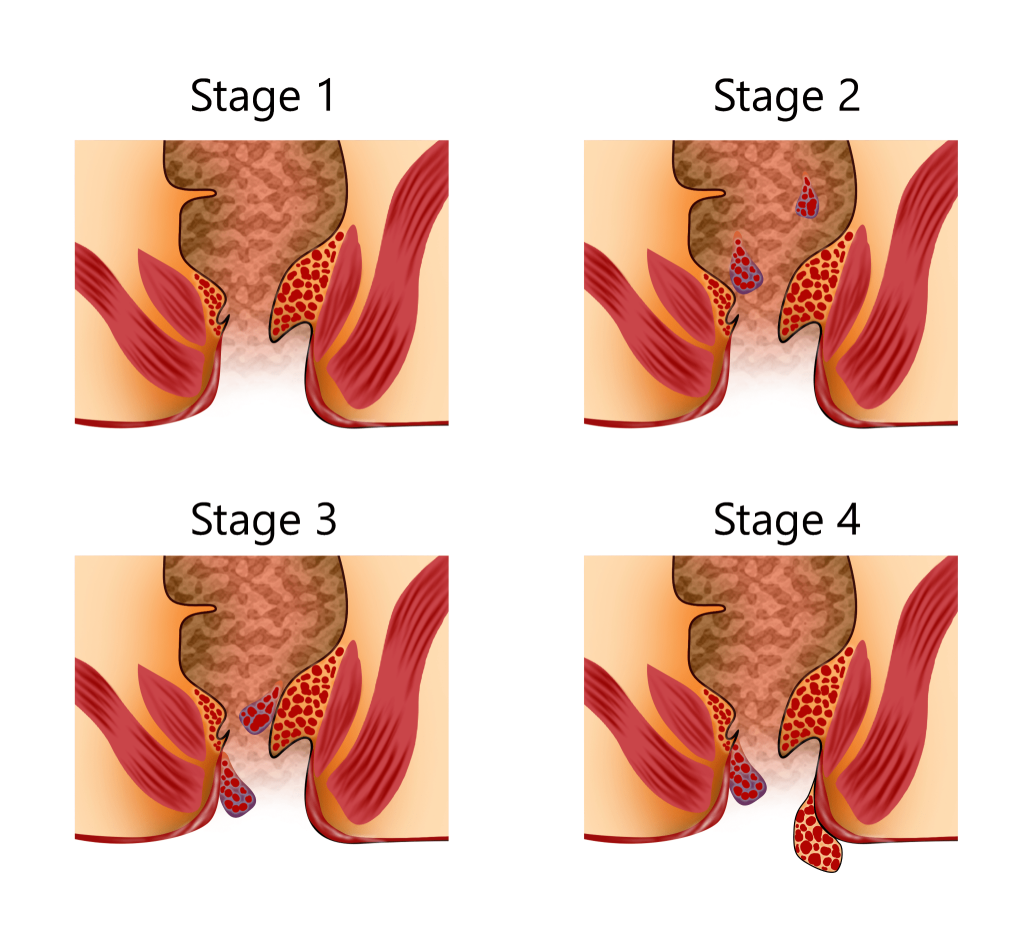
Piles that are left untreated may give rise to several complications, such as:
- Anaemia: Long term haemorrhoids can cause bleeding, and you may experience lower blood count, making you feel tired.
- Worsening haemorrhoids: Leaving your haemorrhoids untreated can result in the condition worsening and prolapsed piles (bulging outwards from the anus), which causes pain and discomfort.
How Do I Prevent Piles From Recurring?
You may prevent piles from recurring by:
- Eating a diet containing high fibre food
- Drinking plenty of water
- Avoid straining on the toilet
- Going to the toilet whenever needed (try not to wait)
- Exercise regularly
- Maintain a healthy body weight
- Cut down on alcohol and caffeine to avoid constipation
Summary
Dr Benjamin Yip, Gastroenterologist at Alpha Digestive and Liver Centre explains “Whilst piles is a benign condition, the symptoms may mimic those of serious gastrointestinal diseases such as colorectal cancer, inflammatory bowel disease and peri-anal abscess/fistula”. Therefore, if you are currently suffering from any symptoms mentioned above, do contact us.
References
- John Hopkins Medicine (n.d.). Hemorrhoids. [online] www.hopkinsmedicine.org. Available at: https://www.hopkinsmedicine.org/health/conditions-and-diseases/hemorrhoids [Accessed 3 May 2022].
- Lohsiriwat V. Treatment of hemorrhoids: A coloproctologist’s view. World journal of gastroenterology. August 21, 2015. Accessed December 16, 2024. https://pmc.ncbi.nlm.nih.gov/articles/PMC4541377/#:~:text=External%20hemorrhoid%20usually%20requires%20no,band%20ligation%20and%20injection%20sclerotherapy).
- Mayo Clinic (2018). Hemorrhoids - Symptoms and causes. [online] Mayo Clinic. Available at: https://www.mayoclinic.org/diseases-conditions/hemorrhoids/symptoms-causes/syc-20360268 [Accessed 3 May 2022].
- NHS Choices (2020). Piles (haemorrhoids). [online] NHS Choices. Available at: https://www.nhs.uk/conditions/piles-haemorrhoids/ [Accessed 3 May 2022].
- Felman, A. (2022). Piles: Symptoms, causes, and treatments. [online] www.medicalnewstoday.com. Available at: https://www.medicalnewstoday.com/articles/239454#causes [Accessed 3 May 2022].
- National University Hospital (n.d.). Haemorrhoids or Piles. [online] www.nuh.com.sg. Available at: https://www.nuh.com.sg/Health-Information/Diseases-Conditions/Pages/Haemorrhoids-or-Piles.aspx [Accessed 4 May 2022].
- Bafford, A.C. and Bleday, R. (2008). Colorectal Surgery - Hemorrhoidectomy. [online] colorectalsurgery.ucsf.edu. Available at: https://colorectalsurgery.ucsf.edu/conditions--procedures/hemorrhoidectomy.aspx [Accessed 3 May 2022].
- Wu, E.-B., Sung, F.-C., Lin, C.-L., Wu, K.-L. and Chen, K.-B. (2021). Colorectal Cancer Risk in Patients with Hemorrhoids: A 10-Year Population-Based Retrospective Cohort Study. International Journal of Environmental Research and Public Health, [online] 18(16), p.8655. doi:10.3390/ijerph18168655.

